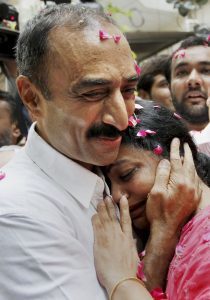Unbowed, Unbent, Unbroken: Sanjiv Bhatt And His Many ‘Convictions’
Aug 15, 2019 | Shalini Rai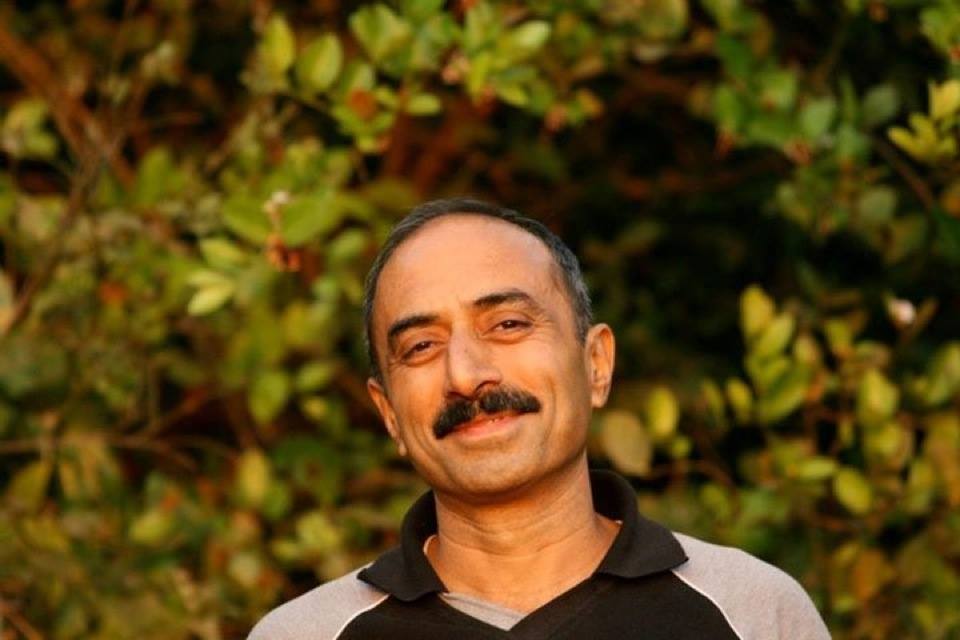
Bhatt (above) is the third accused arrested in the case after social activist Teesta Setalvad and former Director General of Police of Gujarat R B Sreekumar
In June 2019, a Sessions Court sentenced former IPS officer Sanjiv Bhatt to life imprisonment in a custodial death case dating back to 1990. The news received mixed reaction.
Most people felt it was vendetta for Bhatt’s unwavering stance against the most powerful man in the country. Despite 180 cases of custodial death in 16 years, ending in 2016, there had been not one conviction of a Gujarat policeman. On the other hand, the establishment said the law had taken its course. Bhatt’s defence has been found to be untenable by the court, they pointed out. How then can Narendra Modi or Amit Shah be considered responsbile?
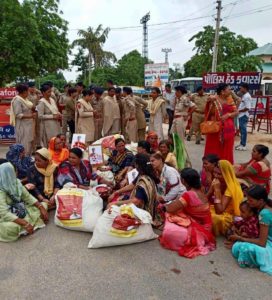
In August 2019, in the lead up to the festival of Rakshabandhan, more than 30,000 rakhis flooded onto Bhatt’s home address, as part of the #OneRakhiForSanjivBhatt campaign. Tens of thousands of women sent the rakhis as a mark of solidarity with Bhatt and his beleaguered family, despite most of them never having seen or met him. Ironically, when Bhatt’s indomitable wife Shweta went to meet him at Palanpur, the authorities disallowed her from giving him the rakhis.
The story of Bhatt’s life after 2002 is a tableau of such slights and ‘punishments’. In August last year, it was the shocking act by the Ahmedabad municipal authorities of demolishing part of his house. What followed close behind was the road ‘accident’ in which Shweta Bhatt’s car was severely-damaged by a dumper, in an area which is out-of-bounds for dumpers. These and more intimidating actions have been initiated against Bhatt and his family because he has dared to speak out against the highest authorities, without fearing for his own safety and the well-being of his family. In a recent letter he wrote from prison, Bhatt says to his wife, “….the last few years have not been easy on you or on the kids. All of you stood with my decision to walk away from the Indian Police Service with my head held high, even though I did not know where I would be going. All of you have willingly paid the price for my decision to stake everything I had, in order to become everything that I needed to be, for serving the cause that was larger than all of us.”
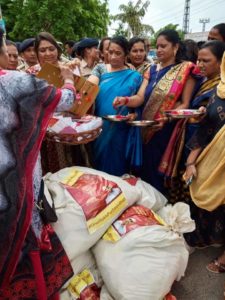
Sanjiv Bhatt is today behind bars in a case of custodial death. It is essential to look at this case in detail.The port town of Jamnagar was Bhatt’s first posting and he took charge as Assistant Superintendent of Police (ASP) on October 10, 1990. On October 30, riots erupted in Jamjodhpur, 77 km from Jamnagar, following a bandh call given by the Vishwa Hindu Parishad (VHP) and the BJP to protest the arrest of veteran BJP leader L K Advani during his Somnath-to-Ayodhya Rath Yatra.
Sanjiv was ordered by Jamnagar district superintendent of police TS Bisht, his superior, to rush to Jamjodhpur to control the law and order situation. He claims to have reached Jamjodhpur around 1 pm on October 30. By that time, curfew had been imposed in the town and 133 rioters rounded up by the police.
During the day, DM and Collector of Jamnagar Haribhai Patel and SP TS Bisht also reached Jamjodhpur to supervise measures taken. The next day, on October 31, the rioters, booked under TADA by the Jamjodhpur police, were presented in court, which sent them to judicial custody. Among the rioters were two brothers, Prabhudas and Ramesh Vaishani, both VHP activists.
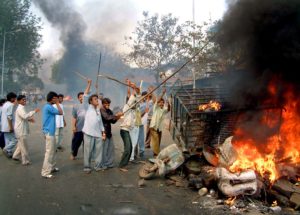
All the 133 rioters were released from jail on bail after eight days on November 8. Four days later, 40-year-old Prabhudas Vaishani complained of back pain and was taken first to a hospital in Jamnagar and later to Rajkot for treatment. On November 18, Prabhudas died in Rajkot hospital. The doctors attending to him declared ‘acute renal failure’ as the cause of his death.
Prabhudas’ brother Amrutlal Madjavji Vaishnani, also an active member of the VHP/BJP, then asked for a post-mortem of his brother’s body. His application was treated as an FIR by the Jamnagar Police and was sent to Jamjodhpur for investigation.
In the 30 intervening years, the case witnessed several twists and turns.
The case was first given to the state CID (Crime) for investigation. Following scrutiny of 2,500 pages of evidence from logbooks of vehicles, wireless messages and examining more than 200 witnesses, the Crime Branch declared that there was no evidence found against Bhatt and the five policemen accused in the case.
CID (Crime) concluded that there was no evidence that Prabhudas Vaishani and Ramesh Vaishani were ever in custody of Sanjiv Bhatt or his team. The report also observed that none of the 133 arrested by the Jamjodhpur police, including Prabhudas, had complained of either any discomfort or of ill-treatment to any doctor or medical professional. Moreover, their medical examination, done by doctors at the prison, also did not find any external or internal injury to Prabhudas.
CID (Crime) had sought and obtained the expert opinion of celebrated nephrologist Padmashri Dr HL Trivedi, the founder director of the well-known Kidney Disease and Research Institute of Ahmedabad, by sending him all the medical reports, treatment papers, post-mortem reports and related tests.
Dr Trivedi, in his expert opinion, stated that there was no indication of “Rhabdomyolosis” as the cause of death of Prabhudas Vaishani, thereby further confirming that the cause of death was not due to any torture.
The superintendent of CID (Crime), investigating the case, also confirmed from the police sub-inspector and other policemen of Jamjodhpur, who had arrested and had the custody of Prabhudas Vaishani, that at no point in time was his custody handed over to Sanjiv Bhatt nor had he ever interrogated him.
After the State CID (Crime) submitted its investigation report, the Gujarat government refused to sanction the prosecution of Sanjiv Bhatt and other accused police officers. Thereafter, the prosecution filed a closure report in the court in 1995.
Bhatt’s systemic harassment started in 2011 after he deposed before the Nanavati Commission. But why had he waited till 2011 to disclose what Narendra Modi had allegedly said in 2002? Was it an after-thought? The National Herald writer Nachiketa Desai says his explanation has always been that the Nanavati Commission had summoned him and he was deposing under oath for the first time.
In any case, Sanjiv was first suspended for having abstained from duty – he was required to remain present before the Nanavati Commission which summoned him – and finally dismissed from Indian Police Service after Narendra Modi became Prime Minister in 2014.
Sanjiv Bhatt writes in his letter to his wife Shweta Bhatt how his hounding started in August 2018, “with the vindictive demolition of the legally retrofitted portions of our house without even giving us a fair chance to challenge the grossly illegal demolition. I can only imagine how very painful it must’ve been for you to helplessly watch portions of the home you created and tended with so much love, being pulled down by the supplicant stooges of a thuggish government. This was followed by my arrest in a 24-year-old case on completely-fabricated evidence. And of course, the icing was the brazenly unjust and arbitrary conviction in a 29-year-old case of “Custodial” death that occurred 18 days after the TADA accused was released from police custody.”
Then, on September 5, 2018, he was arrested in connection with a 24-year-old case involving a lawyer from Rajasthan who had accused Gujarat Police of implicating him in a false drug-peddling case. Sanjiv has been lodged in Palanpur Jail since then and has been repeatedly denied bail.
Meanwhile, the trial of the case of custodial death against him in the Jamnagar session’s court began on a fast-track, leading to his conviction and sentencing of life imprisonment delivered on June 20, 2019.
A close perusal of the session court’s order spanning 430 pages and written in Gujarati, indicates that the court has given no reason for disregarding the closure report filed in 1995. Nor did the court find anything abnormal in the Prosecution not examining any of the investigating officers of the CID (Crime).
The prosecution examined 32 witnesses, a majority of them VHP activists who had been rounded up in 1990. At Bhatt’s insistence and following intervention by the high court, three IPS officers – HP Singh, PP Pandey and TS Bisht were examined as court witnesses. None of their testimony implicated Bhatt of any wrongdoing. But it is not clear why the court ignored their deposition.
While the Defence pleaded that there was no evidence that the deceased was ever in the custody of Bhatt, that there was no evidence of any torture and there was no motive for torture either, the court relied on the oral submissions of VHP activists.
Statements of witnesses recorded during the investigation by the state CID (Crime) had revealed that they had never witnessed any torture or forced sit-ups by the detainees.
But these witnesses were also not examined.
The public prosecutor presented 32 witnesses during the trial. They included 17 of the 133 VHP activists arrested by the Jamjodhpur town police on October 30, 1990 for rioting and arson. Among the prosecution witnesses were four doctors who gave first-aid to those injured in police action on rioters on the day of the bandh.
The prosecution objected to the defence advocates’ plea to submit case diaries and log reports of vehicles used by the accused, saying they were not admissible because the entries were made by the accused themselves.
No officer, police staff or any authorities have given any deposition stating that Sanjiv Bhatt or his staff removed any of the arrested rioters, including Prabhudas Vaishani, from the custody of the local police.
Even doctors and medical professionals who had tended to the deceased and had performed post-mortem, as well as provided expert opinion, were not examined by the prosecution.
And when the Defence requested for permission to produce and examine a Forensic Medicine Expert, Dr Reddy, from Hyderabad, the court ordered that he be produced in court three hours later, despite being informed that he would be travelling from Hyderabad.
Sanjiv Bhatt continues to remain in prison, any bail plea summarily-dismissed and growing public anger ignored. As he puts it in his letter, “Today, India has reached a stage where it’s becoming increasingly apparent that the state represents concentrated and organised violence. Thuggery has been allowed to elevate itself into a technique of governance. The so-called watchdogs of democracy have been tamed into whimpering submission. In these times of all-round institutional undermining and systemic subversion, no institution or organisation is safe. The courts of our country are apparently adjudicating, but truth and justice don’t necessarily enter the equation.”
Former IPS officer Amitabh Kumar Das has spoken out in support of Sanjiv Bhatt, even going on to compare him to Nelson Mandela! “When Mandela came out of prison in 1990, he strode like a colossus. His enemies looked like pygmies in comparison. Mandela went on to become the country’s President and ushered in a rainbow nation, where people of different colours thrived. UNESCO later declared Mandela’s prisons as World Heritage Sites!”
He says, “I have admired Sanjiv Bhatt for years. When other IAS and IPS officers behaved like caged parrots of their political masters, Bhatt roared as a lion of Gujarat’s Gir jungles. When top cops turned into bootlickers of third-rate netas, Bhatt stood like the Rock of Gibraltar! He called a spade a spade and paid for his principles dearly. Bhatt submitted an affidavit holding Narendra Modi responsible for bloody Gujarat riots! When officers in khaki cowered in Modi’s presence, Bhatt told the truth.”
Das continues, “Bhatt was hounded ruthlessly. He was sent behind bars. When Modi became the PM, Bhatt was dismissed on frivolous grounds. Then he was framed in a drugs related case. And now implicated in a custodial death case going back to 1990 when Advani was on the rampage and his Rath Yatra was spilling blood across India. But Sanjiv Bhatt is a fighter of the highest order. A battle-hardened cop who has been single-handedly giving sleepless nights to fascists for years. Let us all rally behind Shweta Bhatt, Sanjiv Sir’s brave wife. In the fight against fascism, we all are Sanjiv Bhatts.”
Bhatt’s case is a litmus test for the institutions of our country — courts, investigating agencies and human rights groups — based as it is on the reputation of an upright whistle-blower. Social worker and writer Harsh Mander says in a letter to Bhatt that what he is undergoing is transparently the consequences of the extreme hubris of both Narendra Modi and Amit Shah, and of the brazen abuse of state power for petty revenge against a courageous and undaunted whistle-blower. “I cannot recall any comparable case of a whistle-blower in India — of a senior official who dared to raise his voice against the person occupying highest office — who was punished in the way that you have been, sentenced to spend the next three decades of your life in jail,” says Mander.
The fact that Bhatt could be punished in this way holds a mirror first to the craven collapse of the integrity and independence of India’s institutions of criminal justice, notes Mander. “Dismissal is the gravest administrative punishment that an officer can be dealt with, reserved in the rarest of cases only for the most serious offences by public officials. Yet the UPSC passed orders dismissing you from service, without even giving you the chance to defend yourself. The mystery of why the highest powers of the land were so determined that you be dismissed from service is easily resolved by the way that you had used those days of ‘unauthorised leave’. You had daringly, as a serving police officer of the Gujarat cadre of the Indian Police Service, testified against the country’s prime minister, Narendra Modi, charging him with criminal complicity in mass murder.”
Bhatt had done this before the Special Investigation Team of the Supreme Court, and Raju Ramachandran, the amicus curiae of the Supreme Court (and later filed this as a written statement in an affidavit to the Supreme Court). The Special Investigation Team of the Supreme Court and the amicus curiae were investigating charges by Zakia Jafri, widow of the former MP Ehsan Jafri, who was brutally killed with around 70 other people at the Gulbarg Society of Ahmedabad, in 2002. Zakia Jafri had claimed that the then chief minister, Narendra Modi, was the first accused for a “deliberate and intentional failure” to protect life and property, and failure to fulfil his constitutional duty.
Mander notes, “Your dismissal from service was as shocking as it was unprecedented. But we thought then that they had done their worst by you. We did not anticipate that much worse was to follow, and that the powers that be would not rest until their revenge was complete by ensuring that you spend the rest of your life in jail. Your punishment is a reflection of how formidable and threatening you are as a witness in one of independent India’s most important cases of criminal command accountability for communal massacre. Of how dangerous was the evidence which you brought forth. Of how important it was to give a message not just to you but to anyone else in the country who dares to cross swords with the most powerful in the land: if this can be the fate of a senior police officer, then what can happen to an ordinary citizen?”
Sanjiv Bhatt knows what it is like to take on the might of the most powerful men in the nation and stand his ground against a sustained campaign of misinformation, demagoguery, intimidation and villification and yet stay unbent and unbroken. Not for him the courage of the closet coward. Bhatt has been an inspiration to millions of Indians during very dark times. Thousands have rallied behind him and his family in these trying days and testing months. Hope floats, however feebly, in the hearts of countless citizens of India that Bhatt will be out of prison soon. As Mander puts it, “…I know also that you have the strength and the resilience to hold out, to endure, to continue to fight, to stay firm with what you believe to be true and just. And I know that one day, one day surely, you will walk free. With Shweta and your children, and with large numbers of our countrywomen and men, I wait for that day.”
The last word goes to Sanjiv Bhatt, who says, “The thugs-in-power are trying everything at their disposal to silence or discredit the voices of truth, reason and dissent. These are dark times for the Indian Democracy. But nightfall doesn’t come all at once, nor does the tyranny of authoritarian repression. Darkness feeds on ignorance and apathy. We, the people of India, stood silently and watched as institution after institution was subverted and undermined to serve the interests of a thuggish regime that thrived on hatred, falsehood and demagoguery. We allowed the idea of the nation to be conflated with an ideology, a political party, or an individual… whereby anyone questioning that idea is automatically branded anti-national. Friends, India is at a tipping point. The choices we make today will determine our fate for the next few decades. None of us can afford to be in the stands anymore. We’ve got to be in the fight. Politics is not a spectator sport. We may avoid politics, but politics will not avoid us. We must resolve to fight these thugs at all levels. Thuggery should never be allowed to elevate itself into a technique of governance. The thugs-in-power will have to be faced down – whatever the price. We will have to make some difficult choices… but in the end, we’re only the sum of the choices we make. If people like you and me aren’t willing to take risks for what we believe in, nothing will ever change. Every time we see the truth and yet choose not to speak, we die in increments. Standing up against evil and injustice isn’t compulsory, neither is our survival as a democracy. Hope we find the wisdom and courage to choose correctly. When it comes to countering the forces of evil, no act of resistance is insignificant, no fight is too small to be fought. Even the biggest of avalanches are made up of small things… snowflakes. We shall resist. We shall fight. We shall overcome. That is certain.”
